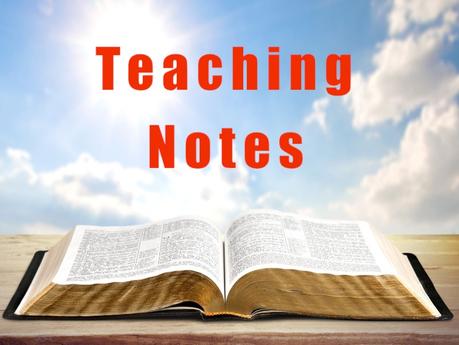Grace Thoughts
Teaching Notes: On Genesis 22

Teaching Notes are Bible studies we taught before GraceLife Ministries began publishing articles online in 1995. Some were presented as sermons, others as group studies.
Our hope is that these older studies will be a blessing to you in your life and ministry. Please use them in any way God leads you.
These teaching notes are from a series of studies about the Book of Genesis.
[These notes are from a study from 45 years ago.]
Genesis 22:1-2
And it came to pass after these things, that God did tempt Abraham, and said unto him, Abraham: and he said, Behold, here I am. And he said, Take now thy son, thine only son Isaac, whom thou lovest, and get thee into the land of Moriah; and offer him there for a burnt offering upon one of the mountains which I will tell thee of.
Sometime later God tested Abraham. We’re not told how long — just that it was later (after these things). Note that this is a test. Of course, Abraham doesn’t know it, but God does. The Lord brings many tests into our lives for purposes that only He knows.
Abraham is to take his only son, Isaac, to the region of Moriah and sacrifice him as a burnt offering on a mountain. We’re not told how Abraham responded initially, but God knew his true feelings when He said, “Take now thy son, thine only son Isaac, whom thou lovest.” God knew the depth of Abraham’s feelings for the boy.
It is not certain where Moriah (mōrîyāh) was located. 2 Chronicles 3:1 might place it where Solomon built his temple. Some think it might be Mount Golgatha where Jesus was crucified (Golgatha might be one of the hills that is part of Mt. Moriah).
Genesis 22:3-14
And Abraham rose up early in the morning, and saddled his ass, and took two of his young men with him, and Isaac his son, and clave the wood for the burnt offering, and rose up, and went unto the place of which God had told him. Then on the third day Abraham lifted up his eyes, and saw the place afar off. And Abraham said unto his young men, Abide ye here with the ass; and I and the lad will go yonder and worship, and come again to you. And Abraham took the wood of the burnt offering, and laid it upon Isaac his son; and he took the fire in his hand, and a knife; and they went both of them together. And Isaac spake unto Abraham his father, and said, My father: and he said, Here am I, my son. And he said, Behold the fire and the wood: but where is the lamb for a burnt offering? And Abraham said, My son, God will provide himself a lamb for a burnt offering: so they went both of them together. And they came to the place which God had told him of; and Abraham built an altar there, and laid the wood in order, and bound Isaac his son, and laid him on the altar upon the wood. And Abraham stretched forth his hand, and took the knife to slay his son. And the angel of the Lord called unto him out of heaven, and said, Abraham, Abraham: and he said, Here am I. And he said, Lay not thine hand upon the lad, neither do thou any thing unto him: for now I know that thou fearest God, seeing thou hast not withheld thy son, thine only son from me. And Abraham lifted up his eyes, and looked, and behold behind him a ram caught in a thicket by his horns: and Abraham went and took the ram, and offered him up for a burnt offering in the stead of his son. And Abraham called the name of that place Jehovahjireh: as it is said to this day, In the mount of the Lord it shall be seen.
Abraham lets no one know what he’s doing — not the boy nor the servants. He places the wood for the burnt offering on Isaac who carries it up (Jesus carried His own wooden cross). Abraham carried the fire and the knife.
The boy asked his father where the sacrifice was, but Abraham answered, “My son, God will provide himself a lamb for a burnt offering” (Jesus, our sacrificial Lamb, is God who spoke with Abraham).
Abraham prepares to slay Isaac, but an angel stops him. The test is over and Abraham has proved his love for, fear of, and obedience to God. God provides a ram to take Isaac’s place and Abraham calls the place “Jehovahjireh” (The Lord will provide).
This is far too close to the events of Christ’s life to miss the prophetic nature of this story. It prefigures the death and resurrection of Christ. Isaac was dead three days in his father’s mind even as Christ lay dead for three days. [More insight given in Hebrews 11:19.]
Even at this writing people looked to the mountain of the Lord for provision (substitutionary atonement).
Genesis 22:15-19
And the angel of the Lord called unto Abraham out of heaven the second time, And said, By myself have I sworn, saith the Lord, for because thou hast done this thing, and hast not withheld thy son, thine only son: That in blessing I will bless thee, and in multiplying I will multiply thy seed as the stars of the heaven, and as the sand which is upon the sea shore; and thy seed shall possess the gate of his enemies; And in thy seed shall all the nations of the earth be blessed; because thou hast obeyed my voice. So Abraham returned unto his young men, and they rose up and went together to Beersheba; and Abraham dwelt at Beersheba.
The angel of God called to Abraham a second time and reminds him of the covenant. The angel gos on to say that Abraham’s descendants will take possession of their enemies’ cities and that all nations will be blessed because of his obedience.
After this Abraham goes back to Beersheba.
Genesis 22:20-24
And it came to pass after these things, that it was told Abraham, saying, Behold, Milcah, she hath also born children unto thy brother Nahor; Huz his firstborn, and Buz his brother, and Kemuel the father of Aram, And Chesed, and Hazo, and Pildash, and Jidlaph, and Bethuel. And Bethuel begat Rebekah: these eight Milcah did bear to Nahor, Abraham’s brother. And his concubine, whose name was Reumah, she bare also Tebah, and Gaham, and Thahash, and Maachah.
In this section we are introduced to Abraham’s nephews. These are children of his brother, Nahor, and his wife, Milcah. Milcah was mentioned in Genesis 11:29 as the daughter of Haran and the sister of Isaac. Haran was also the father of Lot and died several years earlier. It appears that Nahor married his niece.
The way the passage is introduced, it appears that Abraham had lost contact with his brother Nahor. This may have been because Nahor remained in Ur and did not go with Terah, Abraham, Sarai and Lot to Canaan. Whether the feelings were unfriendly or not is hard to tell from the passage.
The firstborn is named Uz (‘ūṣ). Several other persons in the Old Testament have this name. Also, the home of the patriarch Job was known as Uz.
Other bothers mentioned were Buz (būz), Kemuel (qəmū’êl), Kesed (keśeḏ), Hazo (ḥăzōw), Pildash (pildāš), Jidlaph (yiḏlāp̄), and Bethuel (bəṯū’êl).
In this list of Nahor’s sons, it is mentioned that Kemuel was the father of Aram (’ărām) and that Bethuel was the father of Rebekah (riḇqāh), who would become the wife of Isaac.
Nahor also had a concubine named Reumah (rə’ūmāh). His sons through her were Tebah (ṭeḇaḥ), Gaham (gaḥam), Tahash (taḥaš), and Maacah (ma‘ăḵāh).
Next Time
We will look at Genesis Chapter 23 in the next part of our special series.
[Thank you for reading these teaching notes from 45 years ago. My prayer is they will be a blessing to you and your life and ministry.]
 AbrahamGenesisGod's Eternal PlanIsaacJesus ChristSacrifice
AbrahamGenesisGod's Eternal PlanIsaacJesus ChristSacrifice

Published by gracelifethoughts
Founder & Director of GraceLife Ministries View all posts by gracelifethoughts
